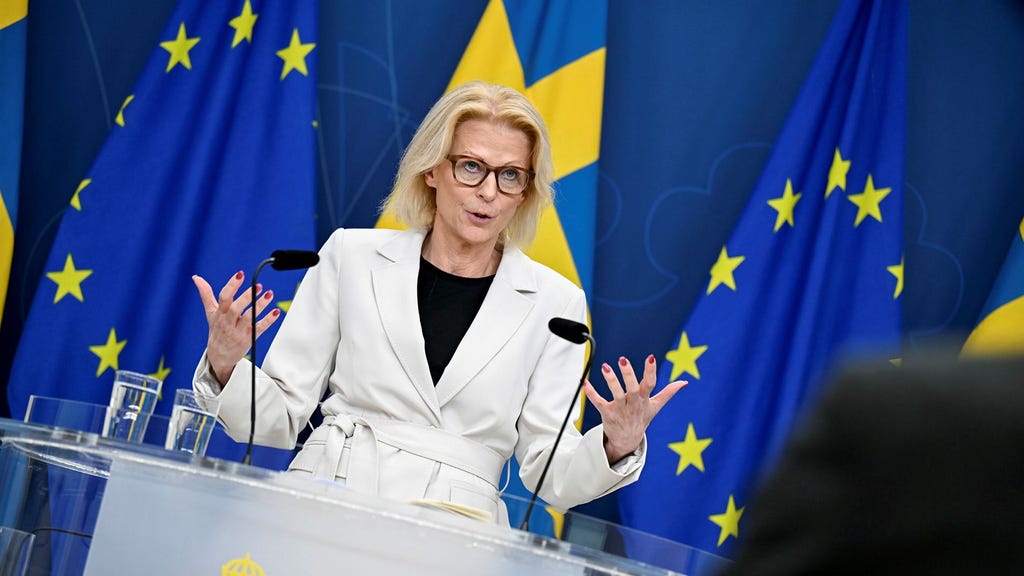The prospect of Donald Trump’s return to the US presidency casts a long shadow over the global economic landscape, with potentially significant negative repercussions for the Swedish economy. A cornerstone of Trump’s previous administration was a protectionist trade policy characterized by the imposition of tariffs, a strategy he might resurrect if re-elected. This poses a substantial threat to Sweden, a nation heavily reliant on international trade, particularly with the United States. The imposition of higher tariffs on Swedish goods entering the US market would directly impact Swedish exporters, potentially reducing their competitiveness and profitability, ultimately hindering economic growth. This concern is not limited to Sweden; many export-oriented economies are wary of a potential resurgence of Trump’s trade policies, recognizing the destabilizing effect they could have on global trade flows and international economic relations.
The anxieties surrounding a potential Trump presidency stem from the concrete economic consequences of protectionist measures. Tariffs, essentially taxes on imported goods, artificially inflate the price of foreign products, making them less attractive to consumers compared to domestically produced alternatives. This can lead to a decrease in demand for Swedish exports in the US market, forcing Swedish companies to reduce production, potentially leading to job losses and a decline in overall economic output. Furthermore, tariffs can disrupt established supply chains, forcing businesses to seek alternative, often more expensive, sources for inputs, further increasing costs and potentially contributing to inflationary pressures. The interconnectedness of the global economy means that these negative effects can ripple outwards, impacting not only the directly targeted countries but also their trading partners and the wider international economic system.
Swedish Finance Minister Elisabeth Svantesson has voiced concerns about the potential impact of US tariffs on the Swedish economy, emphasizing the detrimental effects on both Sweden and other export-dependent nations. A trade war scenario, characterized by escalating tariffs and retaliatory measures, would undoubtedly shrink global GDP, as trade flows are disrupted and economic activity contracts. Svantesson’s concerns reflect a broader understanding within the Swedish government and the international community that a return to protectionist trade policies would be detrimental to global economic prosperity and stability. The potential for decreased trade volumes, reduced economic growth, and increased uncertainty underscores the importance of maintaining open and predictable trading relationships.
The potential economic fallout from a Trump presidency extends beyond tariffs. His previous administration’s unpredictable policy decisions and rhetoric created significant uncertainty in international markets, making it difficult for businesses to plan long-term investments and hindering economic growth. A return to such an unpredictable environment could further damage investor confidence and exacerbate existing economic challenges. The potential for renewed trade tensions with China, another major trading partner for Sweden, adds another layer of complexity and risk to the economic outlook. The interconnectedness of global trade means that disruptions in one major trade relationship can have cascading effects across the global economy, potentially impacting Swedish businesses indirectly through their supply chains or through decreased demand in other markets.
For Sweden, a small, open economy highly dependent on international trade, navigating the potential economic challenges of a Trump presidency requires a multi-pronged approach. Strengthening existing trade relationships with other countries, particularly within the European Union, can help diversify export markets and reduce reliance on the US market. Promoting innovation and competitiveness within Swedish industries can help mitigate the impact of potential tariffs by enhancing the value proposition of Swedish goods and services. Simultaneously, engaging in constructive dialogue with the US government, emphasizing the mutual benefits of open trade and cooperation, remains crucial. While acknowledging the challenges posed by a potential Trump administration, maintaining communication channels and advocating for predictable and fair trade policies is essential for mitigating potential negative impacts.
Finally, preparing for various economic scenarios is crucial for Swedish policymakers and businesses. Developing contingency plans to address potential trade disruptions, investing in workforce development and retraining programs to support workers affected by trade policy changes, and strengthening social safety nets can help mitigate the negative social and economic consequences of potential trade wars. The uncertainty surrounding a potential Trump presidency necessitates a proactive approach, ensuring that Sweden is prepared to navigate the potential economic headwinds and maintain its economic resilience. The global economic landscape is increasingly complex and interconnected, and preparing for potential disruptions, while advocating for open and predictable trade policies, is essential for ensuring long-term economic stability and prosperity for Sweden.














